Reflective Journal on Continuing Professional Development Module
VerifiedAdded on 2023/01/03
|7
|2032
|96
Journal and Reflective Writing
AI Summary
This reflective journal documents a student's experience in a university's 'Continuing Professional Development' module, utilizing Gibbs' reflective cycle to analyze their learning journey. The module encompassed various topics like study skills, business communication, data analysis, and project management, aiming to enhance both personal and professional growth. The student initially felt overwhelmed by the module's breadth and time constraints but gained confidence and motivation as they progressed, eventually completing the assignment. The journal evaluates the student's strengths and weaknesses, highlighting the importance of time management and the development of skills such as decision-making, public speaking, and research. The student concludes with an action plan to improve time management and teamwork in future assignments, emphasizing the value of the course in preparing them for future professional endeavors and highlighting the importance of the Gibbs reflective cycle.
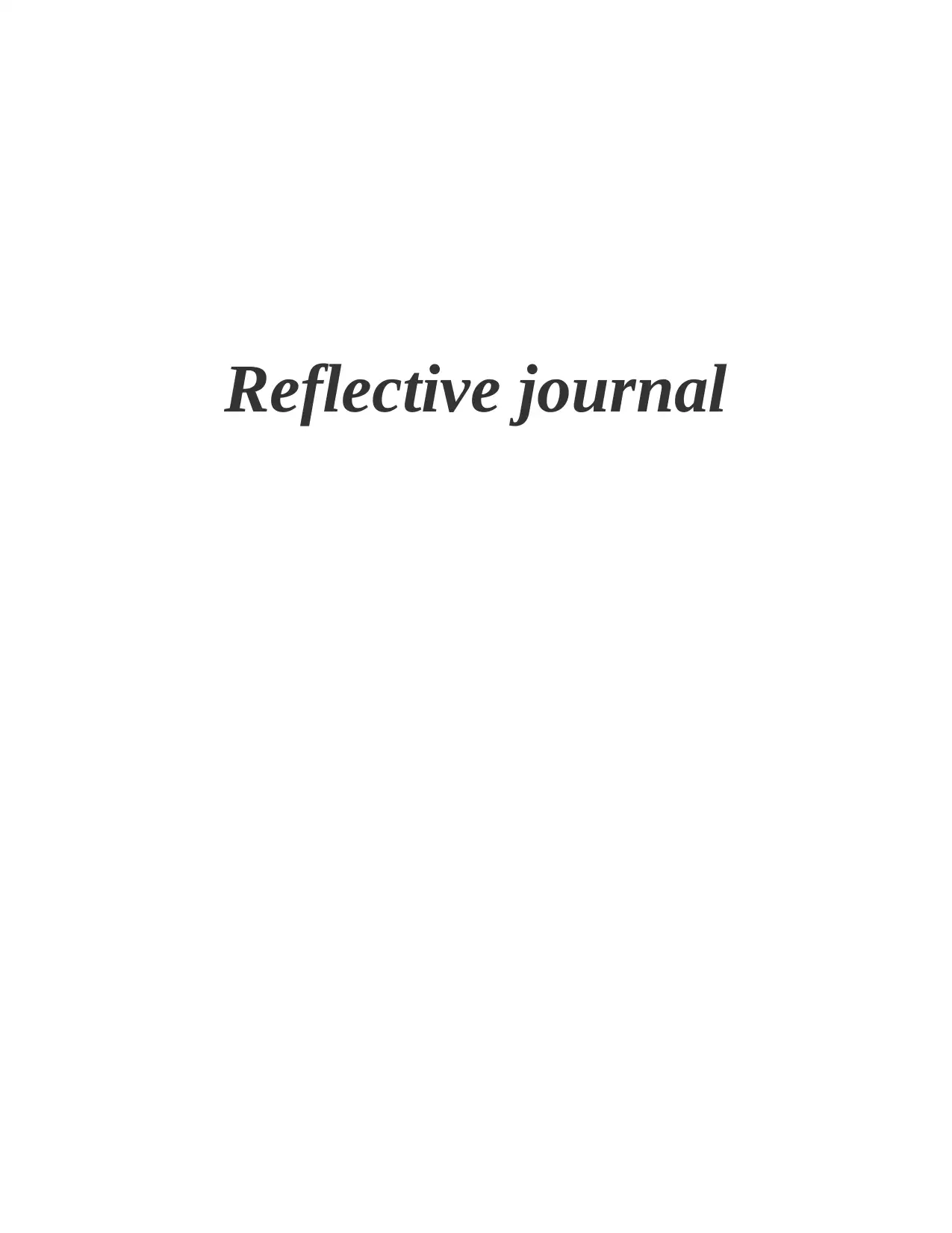
Reflective journal
Paraphrase This Document
Need a fresh take? Get an instant paraphrase of this document with our AI Paraphraser
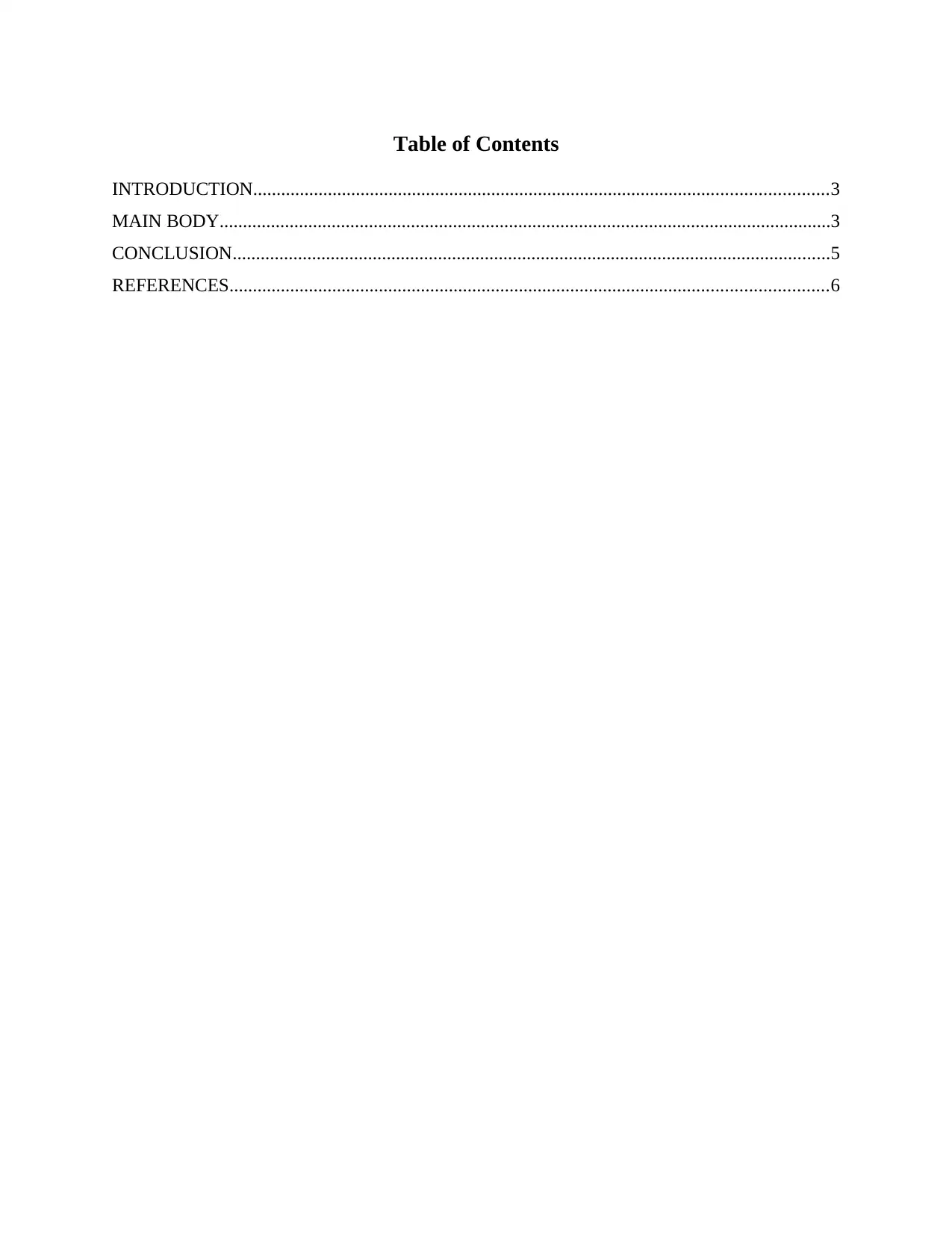
Table of Contents
INTRODUCTION...........................................................................................................................3
MAIN BODY...................................................................................................................................3
CONCLUSION................................................................................................................................5
REFERENCES................................................................................................................................6
INTRODUCTION...........................................................................................................................3
MAIN BODY...................................................................................................................................3
CONCLUSION................................................................................................................................5
REFERENCES................................................................................................................................6
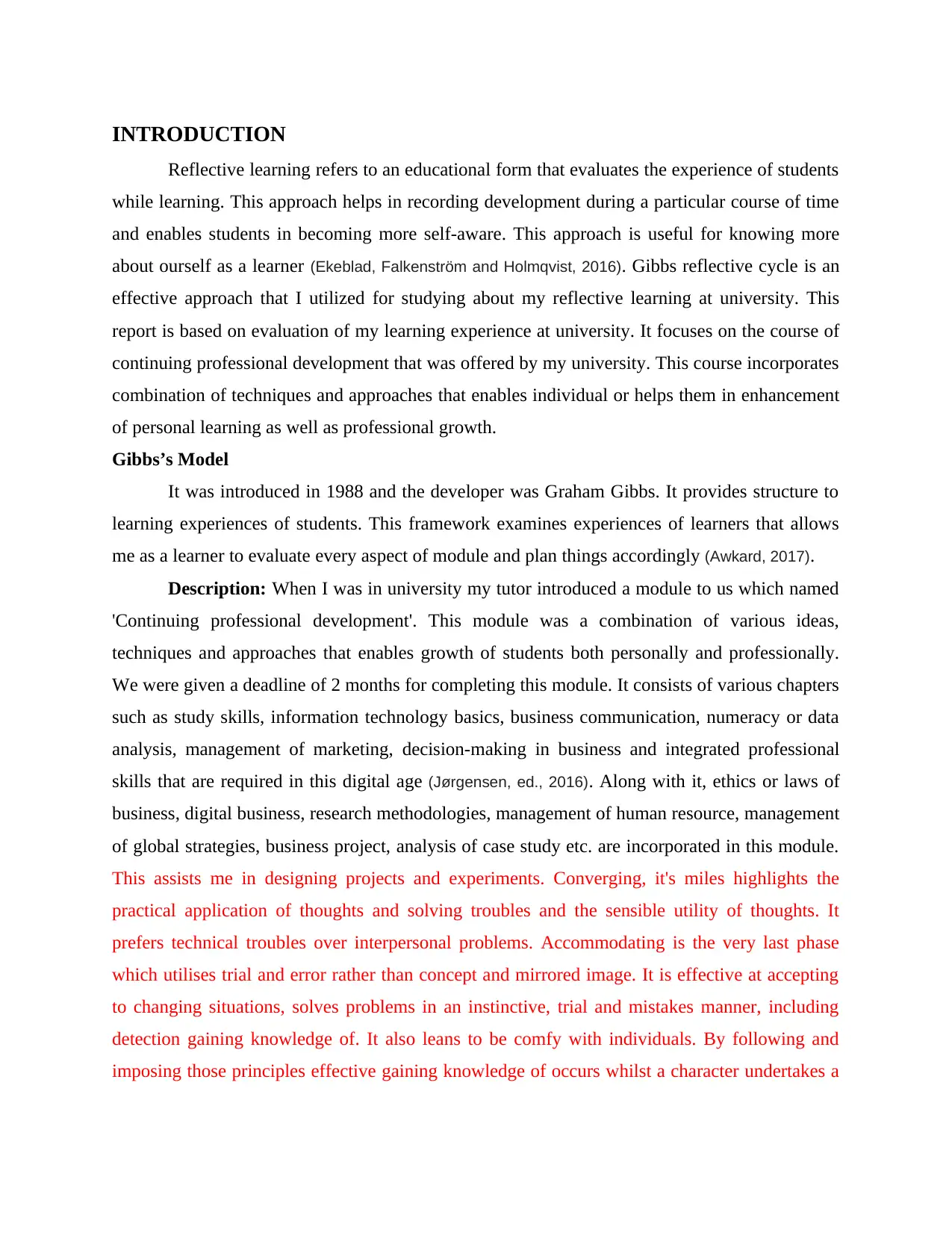
INTRODUCTION
Reflective learning refers to an educational form that evaluates the experience of students
while learning. This approach helps in recording development during a particular course of time
and enables students in becoming more self-aware. This approach is useful for knowing more
about ourself as a learner (Ekeblad, Falkenström and Holmqvist, 2016). Gibbs reflective cycle is an
effective approach that I utilized for studying about my reflective learning at university. This
report is based on evaluation of my learning experience at university. It focuses on the course of
continuing professional development that was offered by my university. This course incorporates
combination of techniques and approaches that enables individual or helps them in enhancement
of personal learning as well as professional growth.
Gibbs’s Model
It was introduced in 1988 and the developer was Graham Gibbs. It provides structure to
learning experiences of students. This framework examines experiences of learners that allows
me as a learner to evaluate every aspect of module and plan things accordingly (Awkard, 2017).
Description: When I was in university my tutor introduced a module to us which named
'Continuing professional development'. This module was a combination of various ideas,
techniques and approaches that enables growth of students both personally and professionally.
We were given a deadline of 2 months for completing this module. It consists of various chapters
such as study skills, information technology basics, business communication, numeracy or data
analysis, management of marketing, decision-making in business and integrated professional
skills that are required in this digital age (Jørgensen, ed., 2016). Along with it, ethics or laws of
business, digital business, research methodologies, management of human resource, management
of global strategies, business project, analysis of case study etc. are incorporated in this module.
This assists me in designing projects and experiments. Converging, it's miles highlights the
practical application of thoughts and solving troubles and the sensible utility of thoughts. It
prefers technical troubles over interpersonal problems. Accommodating is the very last phase
which utilises trial and error rather than concept and mirrored image. It is effective at accepting
to changing situations, solves problems in an instinctive, trial and mistakes manner, including
detection gaining knowledge of. It also leans to be comfy with individuals. By following and
imposing those principles effective gaining knowledge of occurs whilst a character undertakes a
Reflective learning refers to an educational form that evaluates the experience of students
while learning. This approach helps in recording development during a particular course of time
and enables students in becoming more self-aware. This approach is useful for knowing more
about ourself as a learner (Ekeblad, Falkenström and Holmqvist, 2016). Gibbs reflective cycle is an
effective approach that I utilized for studying about my reflective learning at university. This
report is based on evaluation of my learning experience at university. It focuses on the course of
continuing professional development that was offered by my university. This course incorporates
combination of techniques and approaches that enables individual or helps them in enhancement
of personal learning as well as professional growth.
Gibbs’s Model
It was introduced in 1988 and the developer was Graham Gibbs. It provides structure to
learning experiences of students. This framework examines experiences of learners that allows
me as a learner to evaluate every aspect of module and plan things accordingly (Awkard, 2017).
Description: When I was in university my tutor introduced a module to us which named
'Continuing professional development'. This module was a combination of various ideas,
techniques and approaches that enables growth of students both personally and professionally.
We were given a deadline of 2 months for completing this module. It consists of various chapters
such as study skills, information technology basics, business communication, numeracy or data
analysis, management of marketing, decision-making in business and integrated professional
skills that are required in this digital age (Jørgensen, ed., 2016). Along with it, ethics or laws of
business, digital business, research methodologies, management of human resource, management
of global strategies, business project, analysis of case study etc. are incorporated in this module.
This assists me in designing projects and experiments. Converging, it's miles highlights the
practical application of thoughts and solving troubles and the sensible utility of thoughts. It
prefers technical troubles over interpersonal problems. Accommodating is the very last phase
which utilises trial and error rather than concept and mirrored image. It is effective at accepting
to changing situations, solves problems in an instinctive, trial and mistakes manner, including
detection gaining knowledge of. It also leans to be comfy with individuals. By following and
imposing those principles effective gaining knowledge of occurs whilst a character undertakes a
⊘ This is a preview!⊘
Do you want full access?
Subscribe today to unlock all pages.

Trusted by 1+ million students worldwide
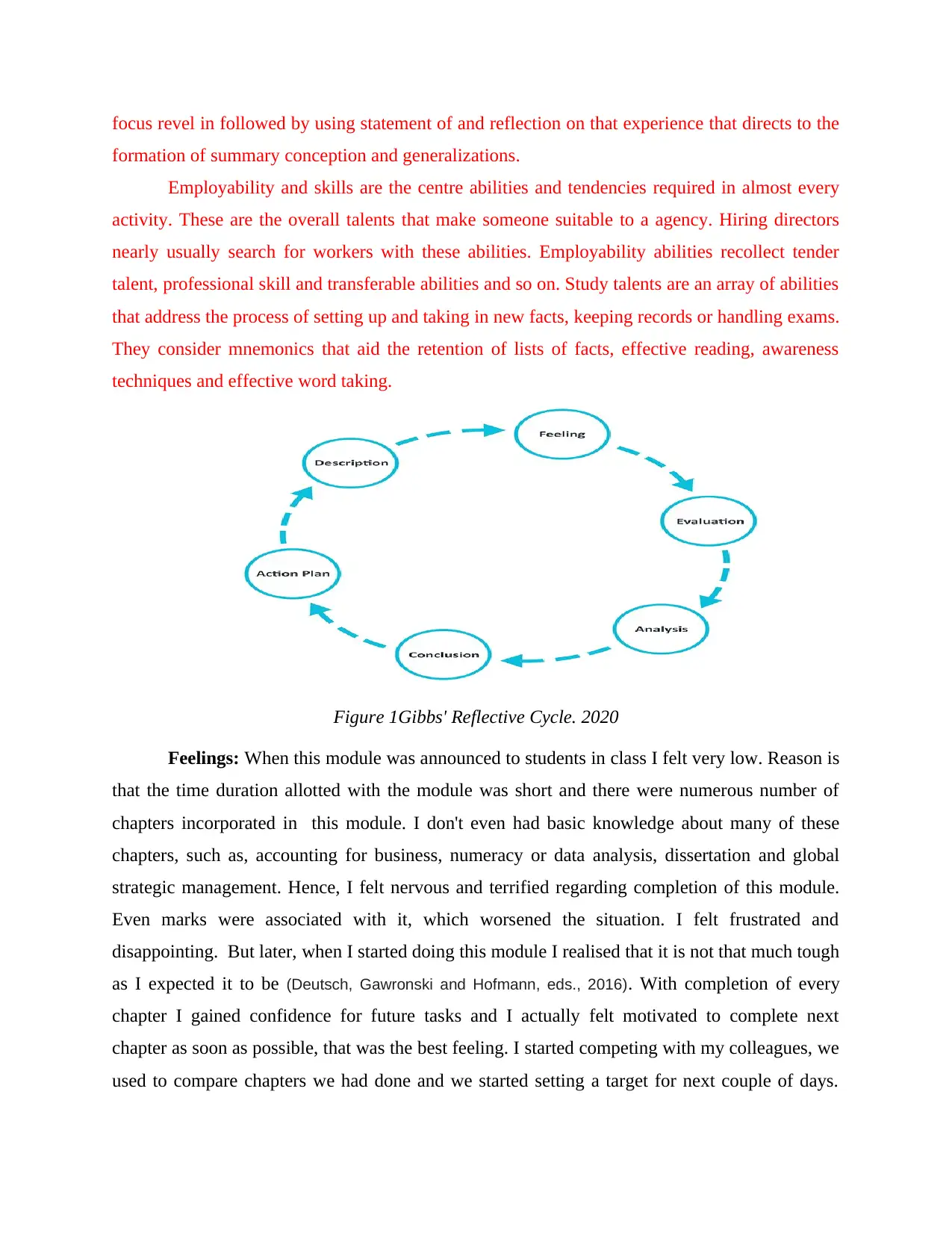
focus revel in followed by using statement of and reflection on that experience that directs to the
formation of summary conception and generalizations.
Employability and skills are the centre abilities and tendencies required in almost every
activity. These are the overall talents that make someone suitable to a agency. Hiring directors
nearly usually search for workers with these abilities. Employability abilities recollect tender
talent, professional skill and transferable abilities and so on. Study talents are an array of abilities
that address the process of setting up and taking in new facts, keeping records or handling exams.
They consider mnemonics that aid the retention of lists of facts, effective reading, awareness
techniques and effective word taking.
Figure 1Gibbs' Reflective Cycle. 2020
Feelings: When this module was announced to students in class I felt very low. Reason is
that the time duration allotted with the module was short and there were numerous number of
chapters incorporated in this module. I don't even had basic knowledge about many of these
chapters, such as, accounting for business, numeracy or data analysis, dissertation and global
strategic management. Hence, I felt nervous and terrified regarding completion of this module.
Even marks were associated with it, which worsened the situation. I felt frustrated and
disappointing. But later, when I started doing this module I realised that it is not that much tough
as I expected it to be (Deutsch, Gawronski and Hofmann, eds., 2016). With completion of every
chapter I gained confidence for future tasks and I actually felt motivated to complete next
chapter as soon as possible, that was the best feeling. I started competing with my colleagues, we
used to compare chapters we had done and we started setting a target for next couple of days.
formation of summary conception and generalizations.
Employability and skills are the centre abilities and tendencies required in almost every
activity. These are the overall talents that make someone suitable to a agency. Hiring directors
nearly usually search for workers with these abilities. Employability abilities recollect tender
talent, professional skill and transferable abilities and so on. Study talents are an array of abilities
that address the process of setting up and taking in new facts, keeping records or handling exams.
They consider mnemonics that aid the retention of lists of facts, effective reading, awareness
techniques and effective word taking.
Figure 1Gibbs' Reflective Cycle. 2020
Feelings: When this module was announced to students in class I felt very low. Reason is
that the time duration allotted with the module was short and there were numerous number of
chapters incorporated in this module. I don't even had basic knowledge about many of these
chapters, such as, accounting for business, numeracy or data analysis, dissertation and global
strategic management. Hence, I felt nervous and terrified regarding completion of this module.
Even marks were associated with it, which worsened the situation. I felt frustrated and
disappointing. But later, when I started doing this module I realised that it is not that much tough
as I expected it to be (Deutsch, Gawronski and Hofmann, eds., 2016). With completion of every
chapter I gained confidence for future tasks and I actually felt motivated to complete next
chapter as soon as possible, that was the best feeling. I started competing with my colleagues, we
used to compare chapters we had done and we started setting a target for next couple of days.
Paraphrase This Document
Need a fresh take? Get an instant paraphrase of this document with our AI Paraphraser
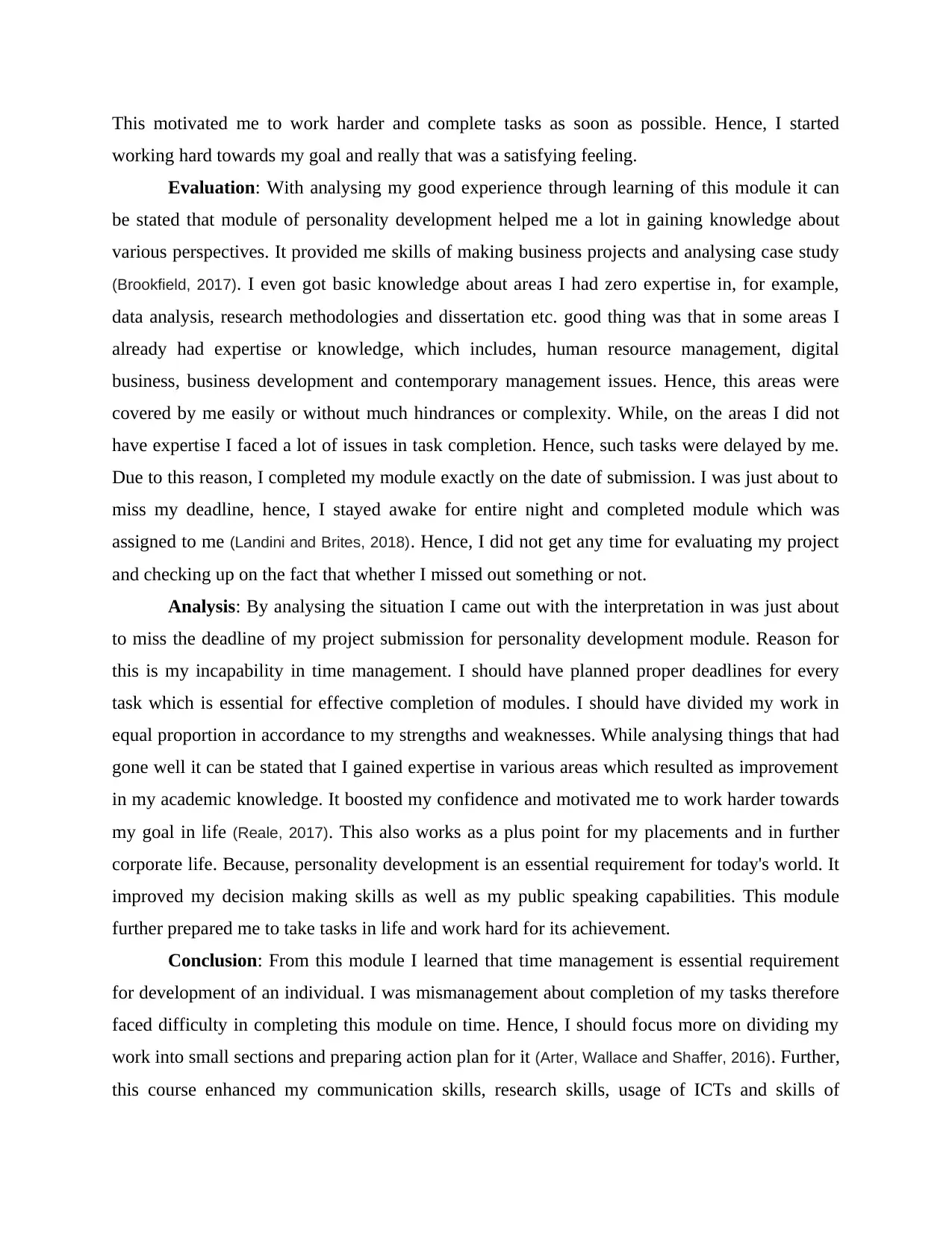
This motivated me to work harder and complete tasks as soon as possible. Hence, I started
working hard towards my goal and really that was a satisfying feeling.
Evaluation: With analysing my good experience through learning of this module it can
be stated that module of personality development helped me a lot in gaining knowledge about
various perspectives. It provided me skills of making business projects and analysing case study
(Brookfield, 2017). I even got basic knowledge about areas I had zero expertise in, for example,
data analysis, research methodologies and dissertation etc. good thing was that in some areas I
already had expertise or knowledge, which includes, human resource management, digital
business, business development and contemporary management issues. Hence, this areas were
covered by me easily or without much hindrances or complexity. While, on the areas I did not
have expertise I faced a lot of issues in task completion. Hence, such tasks were delayed by me.
Due to this reason, I completed my module exactly on the date of submission. I was just about to
miss my deadline, hence, I stayed awake for entire night and completed module which was
assigned to me (Landini and Brites, 2018). Hence, I did not get any time for evaluating my project
and checking up on the fact that whether I missed out something or not.
Analysis: By analysing the situation I came out with the interpretation in was just about
to miss the deadline of my project submission for personality development module. Reason for
this is my incapability in time management. I should have planned proper deadlines for every
task which is essential for effective completion of modules. I should have divided my work in
equal proportion in accordance to my strengths and weaknesses. While analysing things that had
gone well it can be stated that I gained expertise in various areas which resulted as improvement
in my academic knowledge. It boosted my confidence and motivated me to work harder towards
my goal in life (Reale, 2017). This also works as a plus point for my placements and in further
corporate life. Because, personality development is an essential requirement for today's world. It
improved my decision making skills as well as my public speaking capabilities. This module
further prepared me to take tasks in life and work hard for its achievement.
Conclusion: From this module I learned that time management is essential requirement
for development of an individual. I was mismanagement about completion of my tasks therefore
faced difficulty in completing this module on time. Hence, I should focus more on dividing my
work into small sections and preparing action plan for it (Arter, Wallace and Shaffer, 2016). Further,
this course enhanced my communication skills, research skills, usage of ICTs and skills of
working hard towards my goal and really that was a satisfying feeling.
Evaluation: With analysing my good experience through learning of this module it can
be stated that module of personality development helped me a lot in gaining knowledge about
various perspectives. It provided me skills of making business projects and analysing case study
(Brookfield, 2017). I even got basic knowledge about areas I had zero expertise in, for example,
data analysis, research methodologies and dissertation etc. good thing was that in some areas I
already had expertise or knowledge, which includes, human resource management, digital
business, business development and contemporary management issues. Hence, this areas were
covered by me easily or without much hindrances or complexity. While, on the areas I did not
have expertise I faced a lot of issues in task completion. Hence, such tasks were delayed by me.
Due to this reason, I completed my module exactly on the date of submission. I was just about to
miss my deadline, hence, I stayed awake for entire night and completed module which was
assigned to me (Landini and Brites, 2018). Hence, I did not get any time for evaluating my project
and checking up on the fact that whether I missed out something or not.
Analysis: By analysing the situation I came out with the interpretation in was just about
to miss the deadline of my project submission for personality development module. Reason for
this is my incapability in time management. I should have planned proper deadlines for every
task which is essential for effective completion of modules. I should have divided my work in
equal proportion in accordance to my strengths and weaknesses. While analysing things that had
gone well it can be stated that I gained expertise in various areas which resulted as improvement
in my academic knowledge. It boosted my confidence and motivated me to work harder towards
my goal in life (Reale, 2017). This also works as a plus point for my placements and in further
corporate life. Because, personality development is an essential requirement for today's world. It
improved my decision making skills as well as my public speaking capabilities. This module
further prepared me to take tasks in life and work hard for its achievement.
Conclusion: From this module I learned that time management is essential requirement
for development of an individual. I was mismanagement about completion of my tasks therefore
faced difficulty in completing this module on time. Hence, I should focus more on dividing my
work into small sections and preparing action plan for it (Arter, Wallace and Shaffer, 2016). Further,
this course enhanced my communication skills, research skills, usage of ICTs and skills of
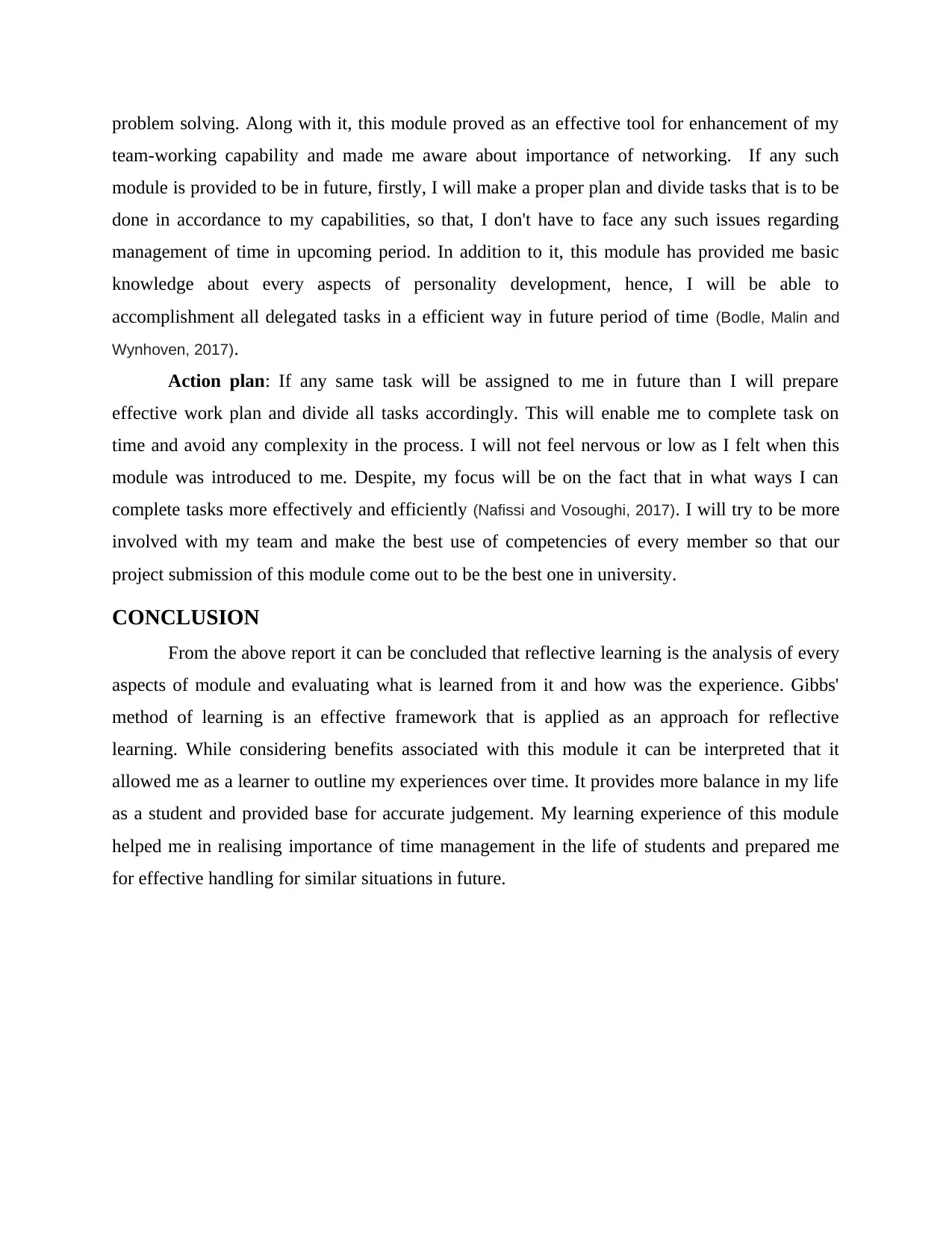
problem solving. Along with it, this module proved as an effective tool for enhancement of my
team-working capability and made me aware about importance of networking. If any such
module is provided to be in future, firstly, I will make a proper plan and divide tasks that is to be
done in accordance to my capabilities, so that, I don't have to face any such issues regarding
management of time in upcoming period. In addition to it, this module has provided me basic
knowledge about every aspects of personality development, hence, I will be able to
accomplishment all delegated tasks in a efficient way in future period of time (Bodle, Malin and
Wynhoven, 2017).
Action plan: If any same task will be assigned to me in future than I will prepare
effective work plan and divide all tasks accordingly. This will enable me to complete task on
time and avoid any complexity in the process. I will not feel nervous or low as I felt when this
module was introduced to me. Despite, my focus will be on the fact that in what ways I can
complete tasks more effectively and efficiently (Nafissi and Vosoughi, 2017). I will try to be more
involved with my team and make the best use of competencies of every member so that our
project submission of this module come out to be the best one in university.
CONCLUSION
From the above report it can be concluded that reflective learning is the analysis of every
aspects of module and evaluating what is learned from it and how was the experience. Gibbs'
method of learning is an effective framework that is applied as an approach for reflective
learning. While considering benefits associated with this module it can be interpreted that it
allowed me as a learner to outline my experiences over time. It provides more balance in my life
as a student and provided base for accurate judgement. My learning experience of this module
helped me in realising importance of time management in the life of students and prepared me
for effective handling for similar situations in future.
team-working capability and made me aware about importance of networking. If any such
module is provided to be in future, firstly, I will make a proper plan and divide tasks that is to be
done in accordance to my capabilities, so that, I don't have to face any such issues regarding
management of time in upcoming period. In addition to it, this module has provided me basic
knowledge about every aspects of personality development, hence, I will be able to
accomplishment all delegated tasks in a efficient way in future period of time (Bodle, Malin and
Wynhoven, 2017).
Action plan: If any same task will be assigned to me in future than I will prepare
effective work plan and divide all tasks accordingly. This will enable me to complete task on
time and avoid any complexity in the process. I will not feel nervous or low as I felt when this
module was introduced to me. Despite, my focus will be on the fact that in what ways I can
complete tasks more effectively and efficiently (Nafissi and Vosoughi, 2017). I will try to be more
involved with my team and make the best use of competencies of every member so that our
project submission of this module come out to be the best one in university.
CONCLUSION
From the above report it can be concluded that reflective learning is the analysis of every
aspects of module and evaluating what is learned from it and how was the experience. Gibbs'
method of learning is an effective framework that is applied as an approach for reflective
learning. While considering benefits associated with this module it can be interpreted that it
allowed me as a learner to outline my experiences over time. It provides more balance in my life
as a student and provided base for accurate judgement. My learning experience of this module
helped me in realising importance of time management in the life of students and prepared me
for effective handling for similar situations in future.
⊘ This is a preview!⊘
Do you want full access?
Subscribe today to unlock all pages.

Trusted by 1+ million students worldwide
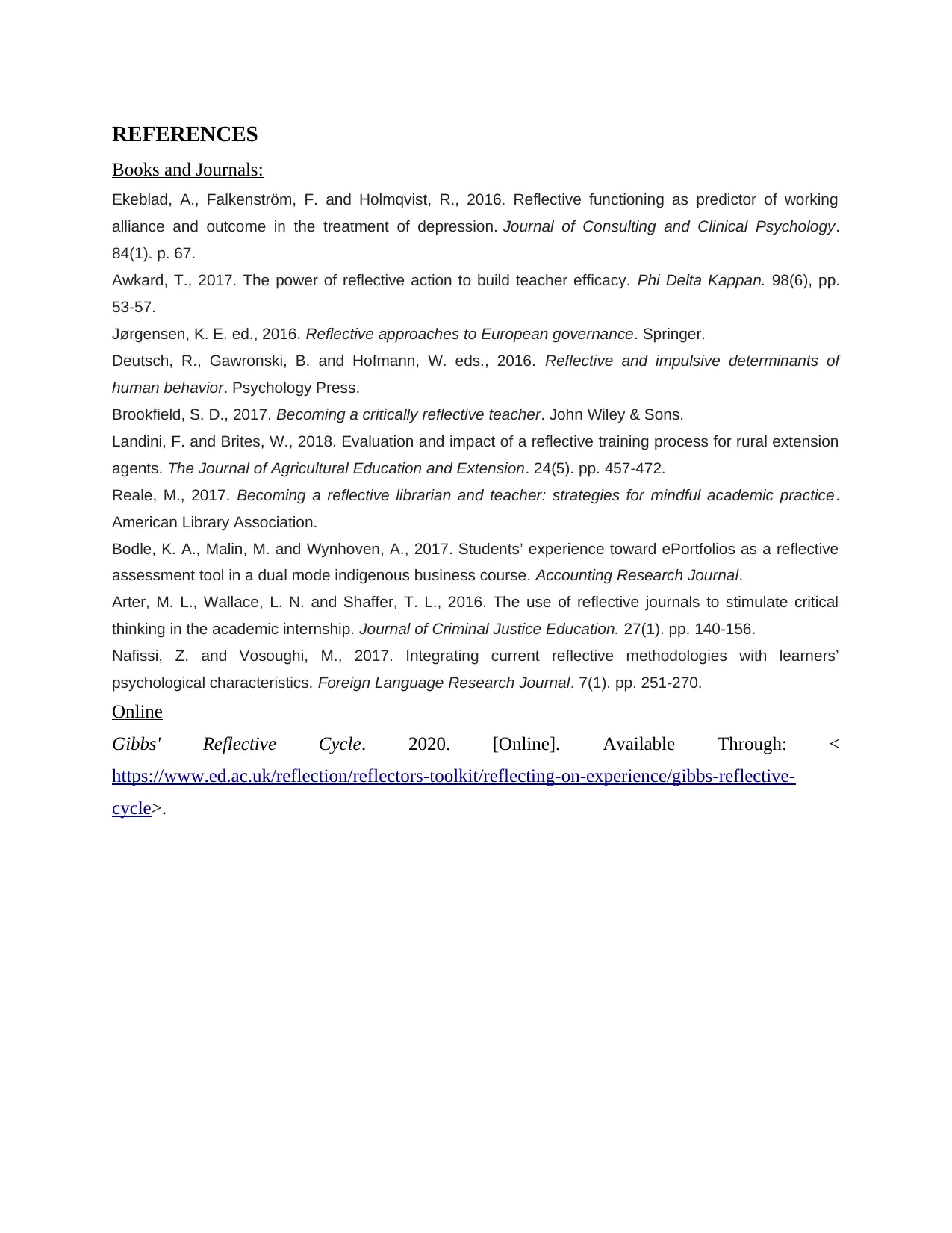
REFERENCES
Books and Journals:
Ekeblad, A., Falkenström, F. and Holmqvist, R., 2016. Reflective functioning as predictor of working
alliance and outcome in the treatment of depression. Journal of Consulting and Clinical Psychology.
84(1). p. 67.
Awkard, T., 2017. The power of reflective action to build teacher efficacy. Phi Delta Kappan. 98(6), pp.
53-57.
Jørgensen, K. E. ed., 2016. Reflective approaches to European governance. Springer.
Deutsch, R., Gawronski, B. and Hofmann, W. eds., 2016. Reflective and impulsive determinants of
human behavior. Psychology Press.
Brookfield, S. D., 2017. Becoming a critically reflective teacher. John Wiley & Sons.
Landini, F. and Brites, W., 2018. Evaluation and impact of a reflective training process for rural extension
agents. The Journal of Agricultural Education and Extension. 24(5). pp. 457-472.
Reale, M., 2017. Becoming a reflective librarian and teacher: strategies for mindful academic practice.
American Library Association.
Bodle, K. A., Malin, M. and Wynhoven, A., 2017. Students’ experience toward ePortfolios as a reflective
assessment tool in a dual mode indigenous business course. Accounting Research Journal.
Arter, M. L., Wallace, L. N. and Shaffer, T. L., 2016. The use of reflective journals to stimulate critical
thinking in the academic internship. Journal of Criminal Justice Education. 27(1). pp. 140-156.
Nafissi, Z. and Vosoughi, M., 2017. Integrating current reflective methodologies with learners’
psychological characteristics. Foreign Language Research Journal. 7(1). pp. 251-270.
Online
Gibbs' Reflective Cycle. 2020. [Online]. Available Through: <
https://www.ed.ac.uk/reflection/reflectors-toolkit/reflecting-on-experience/gibbs-reflective-
cycle>.
Books and Journals:
Ekeblad, A., Falkenström, F. and Holmqvist, R., 2016. Reflective functioning as predictor of working
alliance and outcome in the treatment of depression. Journal of Consulting and Clinical Psychology.
84(1). p. 67.
Awkard, T., 2017. The power of reflective action to build teacher efficacy. Phi Delta Kappan. 98(6), pp.
53-57.
Jørgensen, K. E. ed., 2016. Reflective approaches to European governance. Springer.
Deutsch, R., Gawronski, B. and Hofmann, W. eds., 2016. Reflective and impulsive determinants of
human behavior. Psychology Press.
Brookfield, S. D., 2017. Becoming a critically reflective teacher. John Wiley & Sons.
Landini, F. and Brites, W., 2018. Evaluation and impact of a reflective training process for rural extension
agents. The Journal of Agricultural Education and Extension. 24(5). pp. 457-472.
Reale, M., 2017. Becoming a reflective librarian and teacher: strategies for mindful academic practice.
American Library Association.
Bodle, K. A., Malin, M. and Wynhoven, A., 2017. Students’ experience toward ePortfolios as a reflective
assessment tool in a dual mode indigenous business course. Accounting Research Journal.
Arter, M. L., Wallace, L. N. and Shaffer, T. L., 2016. The use of reflective journals to stimulate critical
thinking in the academic internship. Journal of Criminal Justice Education. 27(1). pp. 140-156.
Nafissi, Z. and Vosoughi, M., 2017. Integrating current reflective methodologies with learners’
psychological characteristics. Foreign Language Research Journal. 7(1). pp. 251-270.
Online
Gibbs' Reflective Cycle. 2020. [Online]. Available Through: <
https://www.ed.ac.uk/reflection/reflectors-toolkit/reflecting-on-experience/gibbs-reflective-
cycle>.
1 out of 7
Related Documents
Your All-in-One AI-Powered Toolkit for Academic Success.
+13062052269
info@desklib.com
Available 24*7 on WhatsApp / Email
![[object Object]](/_next/static/media/star-bottom.7253800d.svg)
Unlock your academic potential
Copyright © 2020–2026 A2Z Services. All Rights Reserved. Developed and managed by ZUCOL.




